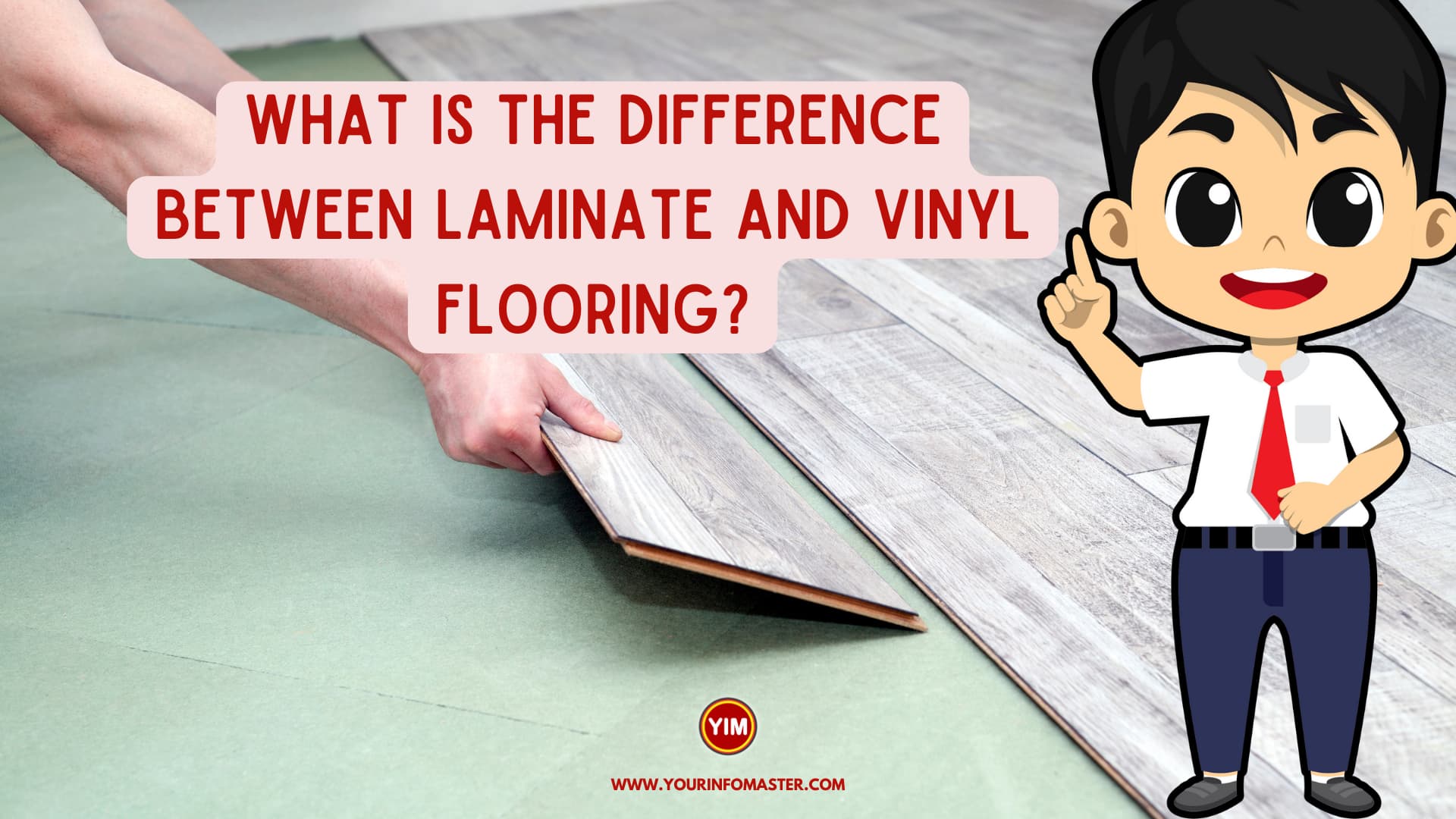I am going to explain the blog post “What is the difference between laminate and vinyl flooring?“
Are you in the market for new flooring but feeling overwhelmed with all of the options available? Two popular choices are laminate and vinyl flooring, but what exactly sets them apart? Both are affordable, durable and versatile options that can mimic the look of hardwood or tile. However, there are some key differences between these two types of flooring that could make one a better fit for your home than the other. In this blog post, we’ll explore those differences to help you make an informed decision on which option is right for you!
Check also: What’s the difference between a bank and a credit union?
What are the different types of flooring?
When it comes to flooring, there are numerous options to choose from. Each type of flooring has its own unique set of characteristics that make them suitable for different environments and lifestyles.
One popular option is hardwood flooring, which is made from solid wood planks or strips. It’s a timeless choice that adds warmth and elegance to any room. Another option is engineered wood, which uses a top layer of real hardwood over multiple layers of plywood or fiberboard for added durability.
Tile flooring offers durability and versatility with options like ceramic, porcelain and natural stone tiles available in various colors and patterns. Carpeting provides comfort underfoot as well as insulation against noise pollution while vinyl floors offer easy maintenance, water resistance and cost-effective installation.
Other types of flooring include bamboo, cork and laminate – each with its own benefits ranging from sustainability to affordability. Ultimately the decision on which type of floor material you select will depend on your personal style preferences along with practical considerations like budget constraints, traffic levels in your home or business space as well as desired level of maintenance required by the chosen material.
Check also: What is the difference between Greek yogurt and regular yogurt?
What is the difference between laminate and vinyl flooring?
Laminate flooring and vinyl flooring are both popular choices for homeowners who want a durable, affordable, and low-maintenance floor covering. However, there are some key differences between the two.
Firstly, laminate flooring is made from compressed wood layers with a photographic image of hardwood or stone on top. Vinyl planks or tiles have multiple layers of synthetic materials that include PVC vinyl, fiberglass and urethane coating.
Secondly, while laminate flooring can mimic hardwood floors quite convincingly in appearance and texture, vinyl flooring has more versatility when it comes to design options. It can imitate natural stone patterns as well as wooden plank designs.
Thirdly, laminate is vulnerable to water damage due to its fiberboard core layer while vinyl is highly resistant to moisture making it ideal for high-traffic areas like kitchens and bathrooms.
Lastly but not least important; one significant difference between these two types of flooring lies in their installation methods: Laminate requires an underlayment pad before installation whereas most luxury vinyl products already come with an attached underlayment backing which simplifies the installation process.
In conclusion! While both laminated floors and vinyl floors offer numerous benefits over other traditional hard surface materials such as tile or hardwoods they differ greatly in terms of composition properties thus require careful consideration according to specific needs before purchasing either product.
Check also: DUI lawyer Colorado Springs Peakstone law
What are the advantages of vinyl flooring?
Vinyl flooring has become increasingly popular in recent years, and for a good reason. There are numerous advantages to choosing vinyl over other types of flooring.
Firstly, vinyl is incredibly durable and long-lasting. Unlike hardwood or laminate flooring that can be easily scratched or chipped, vinyl is resistant to scratches and dents. This makes it ideal for high-traffic areas such as hallways, kitchens, and living rooms.
Secondly, vinyl is waterproof which makes it perfect for rooms that are prone to moisture such as bathrooms and laundry rooms. It’s also easy to clean with just a damp mop or cloth.
Thirdly, there’s a wide range of colors and styles available when it comes to vinyl flooring. Whether you’re looking for the look of hardwood or stone tiles without the cost associated with those materials – there’s a style out there that will suit your needs perfectly.
Installation of vinyl flooring is relatively easy compared to other types of floors like tile or carpeting which require professional assistance. Vinyl planks simply snap together making them an excellent option if you’re looking for a DIY project.
These advantages make choosing vinyl flooring an excellent choice whether you’re renovating your home from top-to-bottom or just updating one room at a time!
What are the disadvantages of vinyl flooring?
Vinyl flooring has many advantages, but it also comes with some disadvantages. One of the main drawbacks is that vinyl floors are not as durable as other types of flooring like hardwood or tile. Vinyl floors can scratch and dent easily, especially if heavy furniture is placed on them.
Another disadvantage of vinyl flooring is that it can be prone to discoloration over time. Exposure to sunlight and UV rays can cause the color to fade or yellow, which may require replacement of the affected area.
Vinyl flooring also has limited design options compared to other types of flooring. While there are many styles and colors available, vinyl floors do not have the same level of customization that natural stone or hardwood provide.
Installation can also be a challenge with vinyl flooring. It requires a smooth and even surface for best results; otherwise, bumps and dips will show through in the finished product. Additionally, installation mistakes such as improper adhesive application or inadequate drying time can result in uneven seams or bubbles in the floor.
While vinyl flooring has its advantages such as affordability and versatility, it’s important to weigh these against its disadvantages before making a decision for your home renovation project.
Conclusion
Vinyl flooring has many advantages, but it also comes with some disadvantages. One of the main drawbacks is that vinyl floors are not as durable as other types of flooring like hardwood or tile. Vinyl floors can scratch and dent easily, especially if heavy furniture is placed on them.
Another disadvantage of vinyl flooring is that it can be prone to discoloration over time. Exposure to sunlight and UV rays can cause the color to fade or yellow, which may require replacement of the affected area.
Vinyl flooring also has limited design options compared to other types of flooring. While there are many styles and colors available, vinyl floors do not have the same level of customization that natural stone or hardwood provides.
Installation can also be a challenge with vinyl flooring. It requires a smooth and even surface for the best results; otherwise, bumps and dips will show through in the finished product. Additionally, installation mistakes such as improper adhesive application or inadequate drying time can result in uneven seams or bubbles in the floor.
While vinyl flooring has its advantages such as affordability and versatility, it’s important to weigh these against its disadvantages before making a decision for your home renovation project.
See also: What’s the difference between oxycodone and oxycontin?
If you really enjoyed the article “What is the difference between laminate and vinyl flooring?,” then I would be very grateful if you’d help it spread by emailing it to your friends or sharing it on Twitter, Instagram, or Facebook. Thank you!
Have you read “What is the difference between laminate and vinyl flooring?“ Which of these blogs are you reading, and how is it similar to one of them?







